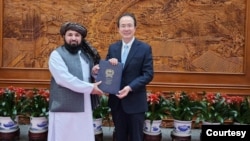Afghanistan’s Taliban government announced Friday that China had formally accepted its ambassador to Beijing, hailing the move as an “important chapter” in growing ties between the two neighboring countries.
The announcement, yet to be confirmed by China, would make it the first nation to host a Taliban ambassador since the Islamist group regained power from an American-backed government in Kabul two years ago.
Neither China nor any other country has formally given recognition to the de facto Afghan administration.
An official Taliban foreign ministry statement said that Hong Lei, the director-general of the protocol department of the Chinese Foreign Ministry, accepted the copy of credentials from the newly appointed ambassador, Asadullah Bilal Karimi.
Hong called Karimi’s arrival an “important step in further strengthening and expanding the positive relations” between Beijing and Kabul.
“China respects the national sovereignty and the decisions of the people of Afghanistan. It does not interfere in the internal Afghan affairs, nor has it done so in the past,” Hong said in Friday’s meeting, according to the Taliban.
Karimi assured the Chinese side that “there is no threat to anyone from the territory of Afghanistan, and regional stability and security is in the interest of all.”
The new ambassador, in his early 30s, served as the deputy spokesman at the Taliban-led information ministry until recently.
Beijing has sought to sustain its close engagement with the Taliban to help prevent the conflict-torn South Asian nation from plunging into chaos again, which could encourage anti-China militants to use Afghan soil to threaten Chinese security.
The Chinese government invited Taliban delegates to its global Belt and Road Forum in October this year, marking the first high-profile multilateral gathering de facto Afghan rulers have attended since returning to power.
Last September, China became the first nation to appoint an ambassador to Kabul under Taliban rule. Other countries either retained their previous ambassadors or appointed the heads of their embassies in a charge d'affaires capacity, which does not require presenting credentials to the host government.
State and private Chinese companies have shown interest in investing in Afghanistan, with some signing contracts with the Taliban in recent months. However, international banking sector sanctions have deterred foreign investors from undertaking major initiatives.
Around 20 neighboring and regional countries have kept their embassies operational or reopened diplomatic missions since the Taliban takeover in August 2021, when all U.S.-led Western troops withdrew from the country and ended their two-decade-long involvement in the Afghan war.
Washington and other Western countries have since moved their Afghan diplomatic missions to Qatar to ensure they can sustain humanitarian aid for millions of Afghans.
Meanwhile, Afghanistan’s neighbors and regional countries, including Russia, India and Turkey, have allowed the Taliban to take control of Afghan diplomatic missions on their respective soils, which are being run at charge d’affairs level.
The Taliban’s global isolation mainly stems from their sweeping curbs on Afghan women’s rights. They have forbidden teenage girls from receiving an education beyond the sixth grade and barred most women from public and private workplaces across the impoverished country, where half of the population needs humanitarian aid.
The de facto authorities are under sustained international pressure to remove restrictions on women, govern the country through an inclusive political setup, and prevent terrorists from operating out of Afghan soil.
The male-only Taliban government has rejected criticism of its policies, saying they are aligned with local culture and Islamic law. They also have claimed no terrorist groups operate in the country.
The United Nations has ruled out granting Afghanistan’s seat to the Taliban until they address international concerns and end their harsh treatment of women.






